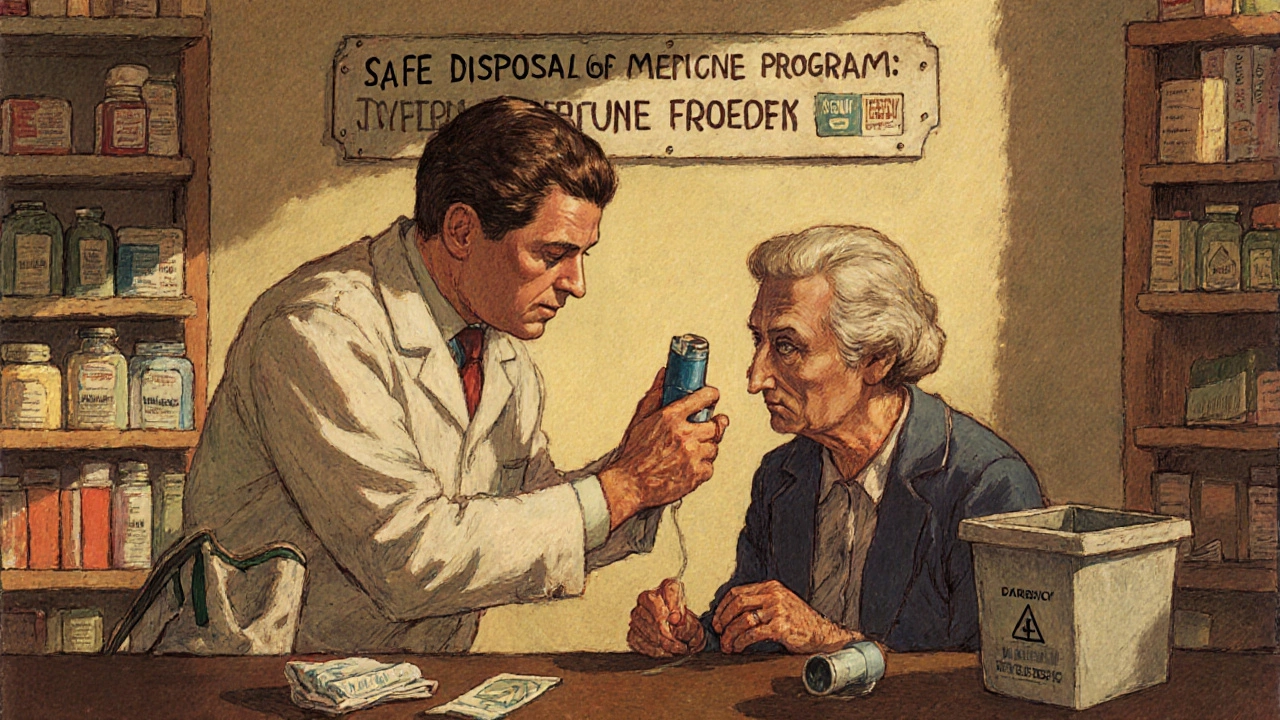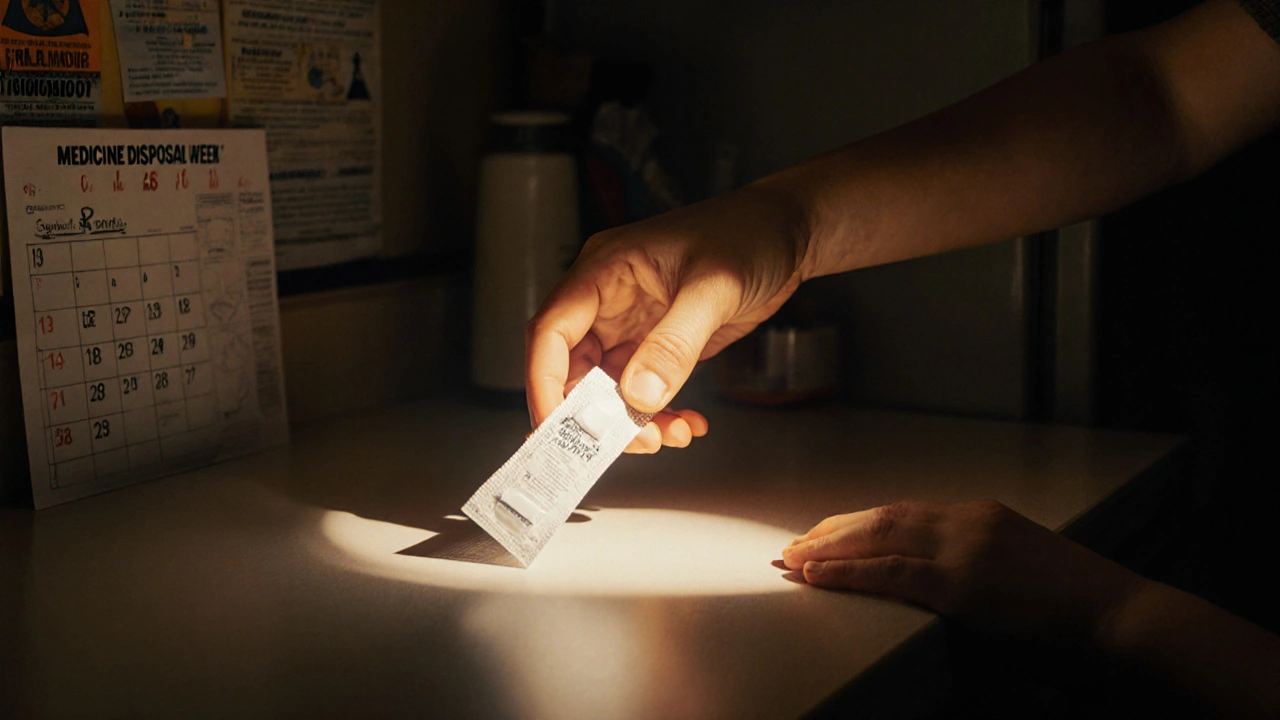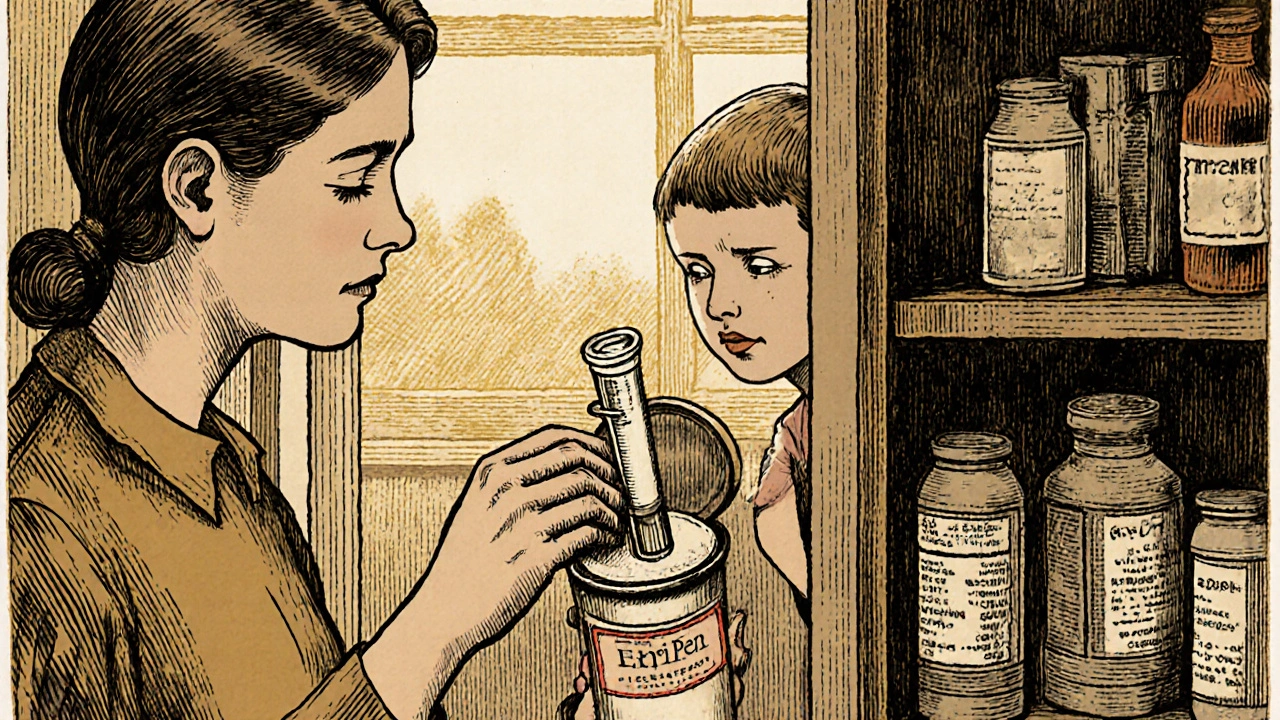Every year, millions of Australians throw away expired EpiPens, inhalers, and medicated patches the wrong way-tossing them in the trash, flushing them down the toilet, or leaving them in medicine cabinets. That’s not just careless. It’s dangerous. Expired epinephrine auto-injectors have needles. Inhalers are pressurized cans that can explode in trash compactors. Patches still hold enough medicine to kill a child if they touch the sticky side. And none of these belong in your regular recycling bin.
Why Proper Disposal Matters
You wouldn’t leave a loaded gun on the kitchen counter. So why leave an expired EpiPen in a drawer where your toddler can find it? The FDA reports that 12% of accidental poisonings in children under five involve discarded medications. That’s not a rare accident. It’s predictable-and preventable. EpiPens contain epinephrine, a powerful drug that can save a life during anaphylaxis. But if someone else gets hold of it-especially a child or pet-it can cause a dangerous spike in heart rate, high blood pressure, or even a stroke. Inhalers use propellants like hydrofluoroalkanes (HFAs), which are potent greenhouse gases. When crushed in landfills or incinerated, they release chemicals that contribute to climate change. Patches, especially fentanyl or nicotine ones, can leak medication through the adhesive even after they’re used. A single patch can contain enough drug to be lethal if ingested or absorbed through skin. The good news? You don’t need to guess how to get rid of them. There are safe, legal, and easy ways to dispose of each type. Here’s exactly what to do.How to Dispose of Expired EpiPens
EpiPens are not regular trash. They’re medical sharps-just like used needles. That means they need to be handled like sharp objects that could puncture skin and spread infection or drug exposure. Step 1: Don’t try to take it apart. No matter how tempting, don’t remove the needle, pry open the casing, or try to drain the liquid. The device is designed to be used as-is, and tampering can cause accidental injection or spillage. Step 2: Put it in a sharps container. If you have a dedicated sharps container (often provided by your pharmacy or doctor), place the EpiPen inside. If you don’t, use a heavy-duty plastic bottle-like an empty laundry detergent bottle or a coffee can. Make sure it’s puncture-proof and has a tight-fitting lid. Label it clearly: SHARPS, BIOHAZARD, DO NOT RECYCLE. Step 3: Take it to a drop-off point. Your best bet is to return it to the clinic or pharmacy where you got your new prescription. Most allergists, hospitals, and pharmacies with a sharps program will take expired EpiPens for free. In Australia, many community pharmacies participate in the Safe Disposal of Medicines Program. You can find your nearest drop-off location at safemedicinesdisposal.org.au. What if you can’t find a drop-off? In some states, like New South Wales, you can put sealed sharps containers in your general household trash-but only if they’re properly labeled and secured. Never put an EpiPen loose in the bin. Check with your local council for rules in your area.How to Dispose of Inhalers
Inhalers are tricky because they’re a mix of plastic, metal, and pressurized gas. You can’t just toss them in the recycling bin. Even empty ones can explode if crushed or heated. Step 1: Check the label. Look for disposal instructions on the box or patient information leaflet. Some brands, like Ventolin or Seretide, now include disposal guidance. Step 2: Use a take-back program. The safest way is to return inhalers to a pharmacy that accepts them. Many Chemist Warehouse, Priceline, and independent pharmacies in Australia have take-back bins for used inhalers. Ask at the counter-most staff know about this program now. Step 3: If no take-back is available, dispose of carefully. Remove the metal canister from the plastic mouthpiece. The plastic part can go in your recycling bin (check your local rules-some councils accept it). The metal canister? Don’t puncture it. Don’t throw it in the fire. Instead, put it in a sealed plastic bag and place it in your general waste bin. Some councils, like Sydney City Council, offer special Household Chemical CleanOut events twice a year where you can drop off inhalers for safe disposal. Pro tip: Don’t wait until it’s expired. Keep track of your inhaler’s expiration date. Most last 12-24 months after opening. Write the opening date on the label with a marker. That way, you know when to replace it-and when to return it.
How to Dispose of Medicated Patches
Patches are the most dangerous to throw away carelessly. Even after use, they can still contain 50-80% of their original dose. Fentanyl patches, for example, are strong enough to kill an adult who isn’t opioid-tolerant. Step 1: Fold it properly. As soon as you remove the patch, fold it in half with the sticky side inward. This traps the medication inside. For high-risk patches like fentanyl, the FDA and Australian Therapeutic Goods Administration recommend flushing it down the toilet immediately after removal. Yes, flushing is allowed for these specific patches because the risk of accidental exposure outweighs environmental concerns. Step 2: For non-flushable patches (like nicotine or lidocaine). If the patch doesn’t say to flush it, fold it in half, stick it to a piece of used tissue or paper, and put it in a sealed plastic bag. Then, place it in your household trash. Never leave a folded patch sitting on the counter or in a drawer. Step 3: Use a take-back bin if possible. Many pharmacies and community health centers now have medication return boxes. You can drop off used or expired patches there-even if they’re folded. This is the most environmentally responsible option.What NOT to Do
Here are the most common mistakes people make-and why they’re dangerous:- Don’t throw EpiPens in the trash loose. A sanitation worker could get stuck. A child could play with it.
- Don’t flush all patches. Only flush fentanyl or other drugs specifically listed on the FDA or TGA flush list. Flushing others harms waterways.
- Don’t put inhalers in recycling. Even if they’re empty, the pressurized gas can cause explosions in recycling trucks.
- Don’t burn them. Burning medications releases toxic fumes.
- Don’t leave them in old medicine cabinets. Expired meds lose effectiveness-and become a hazard.
What About Take-Back Days?
Australia doesn’t have a national drug take-back day like the U.S., but many states run local events. Check with your local council or pharmacy for Medicine Disposal Days. These are often held during National Medicines Awareness Week (first week of October) or World Environment Day (June 5). You can also ask your GP or pharmacist if they participate in the Safe Disposal of Medicines Program. Over 2,000 pharmacies across Australia are part of this program, and they’ll take back unused or expired medications-including patches, inhalers, and auto-injectors-at no cost.
How to Stay Prepared
Prevention is easier than cleanup. Here’s how to avoid disposal chaos:- Check expiration dates every month. Put a reminder on your phone.
- Keep a small, labeled sharps container in your medicine cabinet for EpiPens.
- When you get a new prescription, ask the pharmacist: “Where do I return the old one?”
- Don’t stockpile. Only keep one or two EpiPens on hand. If you’re not using them, you don’t need them.
- Teach your family how to dispose of them. Kids and caregivers need to know too.
What’s Changing?
New rules are coming. In 2024, Australia’s Therapeutic Goods Administration began requiring all prescription medication packaging to include clear disposal instructions. Manufacturers like Mylan (maker of EpiPen) are now adding QR codes to packaging that link directly to disposal guides. Pharmacies are also starting to offer free disposal kits-some even include pre-paid return envelopes. It’s not perfect yet. Rural areas still struggle with access. But awareness is growing. More people are asking, “Where do I take this?” And that’s the first step to safety.Can I throw expired EpiPens in the regular trash?
Only if they’re placed in a sealed, puncture-proof container labeled as SHARPS or BIOHAZARD. Never put them loose in the bin. Most states require you to take them to a pharmacy, hospital, or sharps collection point. Check your local council’s guidelines.
Is it safe to flush medication patches?
Only for specific high-risk patches like fentanyl, as recommended by the Therapeutic Goods Administration. For other patches-like nicotine or lidocaine-fold them in half with the sticky sides together and dispose of them in your household trash. Flushing non-listed patches can contaminate water supplies.
Do pharmacies accept expired inhalers?
Yes, many do. Pharmacies participating in the Safe Disposal of Medicines Program will take back used or expired inhalers. Call ahead to confirm-some only accept them during certain hours. Chemist Warehouse and Priceline are among the most reliable chains.
What should I do with an empty inhaler canister?
Remove the plastic mouthpiece and recycle it if your local council accepts #1 or #2 plastics. The metal canister should be placed in a sealed plastic bag and thrown in your general waste bin. Never puncture it or put it in recycling-pressurized cans can explode.
Are there free disposal kits available?
Yes. Some pharmacies and community health centers now offer free sharps containers and prepaid return envelopes for EpiPens and patches. Ask your pharmacist or check the Safe Disposal of Medicines Program website for participating locations.
What happens if I don’t dispose of these items properly?
Improper disposal can lead to accidental poisonings in children or pets, injuries to waste workers, and environmental contamination. Medications in waterways harm fish and wildlife. In 2023, over 1,200 cases of accidental exposure to discarded medications were reported in Australia alone. Safe disposal protects your family and your community.


Pallab Dasgupta
November 25, 2025 AT 05:59Bro, I just threw out my dad's old EpiPen last week like it was a candy wrapper. Now I'm sweating bullets thinking about it. Thanks for the wake-up call. I'm driving to the pharmacy tomorrow with a coffee can full of sharps. No more excuses.
Dolapo Eniola
November 25, 2025 AT 23:51Y'all in the West got it so easy lol. In Lagos, we just bury 'em in the backyard or toss in the river. Who cares? The government don't even have bins for this stuff. You think your EpiPen is dangerous? Try a 50-year-old amoxicillin bottle in a slum. 😅
Agastya Shukla
November 26, 2025 AT 05:15Interesting breakdown. From a pharmacological standpoint, the bioavailability of residual epinephrine in expired auto-injectors is significantly reduced-often below therapeutic thresholds. However, the physical hazard remains acute. The real issue isn't efficacy, it's the risk of accidental intramuscular injection via compromised casing. Also, HFAs in inhalers have a GWP of ~1400, so even empty canisters are climate liabilities. Proper segregation is non-negotiable.
fiona collins
November 27, 2025 AT 08:54Always fold patches sticky-side in. Always. Simple. Safe. Done.
Karen Willie
November 28, 2025 AT 15:10Thank you for this. My mom has three expired patches in her drawer right now. I’m going to call her after this and walk her through folding them. She’s 78 and thinks ‘if it’s not expired yet, it’s fine.’ We need more clear, calm guides like this.
Ellen Sales
November 29, 2025 AT 05:09Did you know? The FDA’s 2021 guidance on sharps disposal explicitly says: ‘A rigid, puncture-resistant container with a tight-fitting lid, such as a plastic laundry detergent bottle, is acceptable for home use’-and yet, 78% of households still use yogurt cups or soda bottles. We’re not just being careless-we’re being lazy. And laziness kills. I’ve seen it. I’ve seen the ER reports. This isn’t hypothetical. It’s happening right now. To someone’s child. In your neighborhood.
Josh Zubkoff
November 30, 2025 AT 06:43Look, I get it. You’re trying to sound like a public health hero. But let’s be real-how many people actually follow this? The average person doesn’t even know what ‘HFA’ stands for. And don’t get me started on ‘take-back programs’-I called 12 pharmacies in my city. Only two had a bin. One of them was closed. The other said ‘We don’t take inhalers anymore.’ So now what? Do I just keep hoarding expired junk until the apocalypse? This whole thing feels like performative safety. You’re making people feel guilty so you can feel virtuous. Meanwhile, the real problem? Pharma companies still don’t design these things for easy, safe disposal. They want you to buy new ones. And you’re just doing their marketing for them.
giselle kate
December 1, 2025 AT 02:17Of course you’re telling Americans to drive to a pharmacy. In America. Where everything’s accessible. What about the people in rural India who live 50km from the nearest town? You think they’re gonna drive 3 hours to drop off a patch? This is elite-first thinking. We need infrastructure-not guilt trips. And don’t even get me started on flushing. The TGA says flush fentanyl? Fine. But then why don’t they mandate biodegradable patches? Why not design them to deactivate after 24 hours? You’re treating symptoms. Not the disease.
Patricia McElhinney
December 1, 2025 AT 19:32YOur post is so poorly written. You say 'EpiPens are not regular trash'-but you don't say that the needle is stainless steel and can be sterilized and reused in emergency situations in developing countries. You just scare people with 'toxic' and 'deadly' and never mention that 90% of the world doesn't have access to your fancy drop-off programs. You're not helping. You're just making people feel bad. And your grammar? 'Don't try to take it apart.' Should be 'Do not attempt to disassemble.' And why are you using 'you' so much? It's not a TED Talk. It's a public health guide. Fix your tone. And your punctuation. You're missing commas. Like, everywhere. This is embarrassing.
Emily Craig
December 3, 2025 AT 16:04So… I folded my fentanyl patch and flushed it. Then I cried. Not because I’m sad-I’m relieved. My dad’s been on them for 10 years. I used to leave the used ones on the bathroom counter. I thought ‘it’s just a sticky thing.’ Now I know. And I’m not going back. Thank you for making me feel like I didn’t just almost kill someone. 🙏
Leisha Haynes
December 4, 2025 AT 01:36LOL at the people who think flushing patches is ‘eco-terrorism.’ You know what’s worse? A toddler licking a patch off the floor because mom forgot to fold it. I’ve seen it. The ER staff don’t care if you ‘care about waterways.’ They care that you’re holding a screaming kid while they give them naloxone. So yeah. Flush the fentanyl. And stop pretending you’re the environmental savior.
Rachel Villegas
December 5, 2025 AT 09:00Just took my expired inhaler to Chemist Warehouse today. They gave me a free reusable tote bag. I didn’t even ask. Small win. I’m gonna start keeping a little box in my car for old meds now. My sister’s kid has asthma. I’m not taking chances anymore.